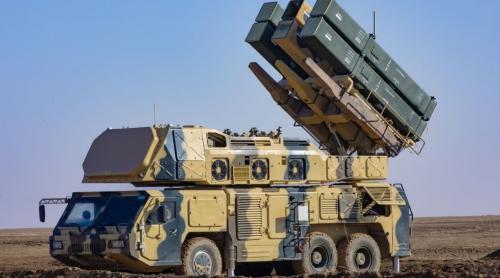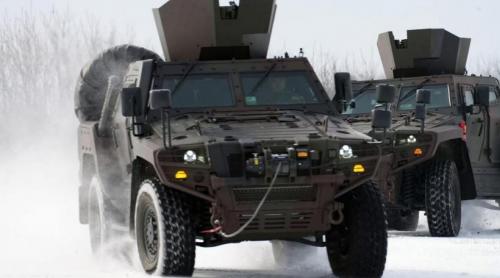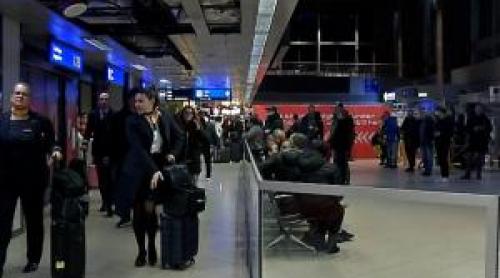
Jurnalul National interviewed Teodor Atanasiu, the minister of defense, on the issue of the controversial Hawk missile system bought by Romania from The Netherlands. On this occasion interesting details surfaced: the military intelligence service did not inform the ministry about the allegations the Hawks caused cancer to its handlers; the amount of money requested by Raytheon for modernizing the vintage equipment is double the one initially assessed; the contract was negotiated last fall and signed speedily in December, by Adrian Nastase, the former PM. The latter denied offering his own version of the events to Jurnalul National:
Jurnalul National: Why is the contract classified?
Teodor Atanasiu: This was one of the provisions in the contract, which is common to many purchase-contracts of military equipment that are not concluded with public bidding.
JN: Did you not find it strange that the contract was signed just before the final round of presidential elections?
TA: Frankly, I was not interested in the date for signing it, but in the actual provisions of the contract. I asked to see it in order to assess the grounds for this public outrage, after it reached Romanian media. Unfortunately, one cannot claim with certainty the Hawk system has lethal effects to its handlers, while the maker vigorously denies any such effects.
JN: Jurnalul National received an official note from your ministry alleging that there was no information passed on the contentious issue of the Hawksâ prior to sealing the contract.
TA: Indeed, at the time, neither the Dutch Executive nor other Dutch entity informed the Romanian ministry of defense of the alleged problems the Hawk system caused. After the ministry asked for such data the Dutch Ministry of Defense sent them; their conclusion was that nothing was wrong with the missile system.
JN: When was that? When the articles were published in Romanian media?
TA: No. After inquires took place in the Dutch Parliament, the military intelligence informed me of the matter and I asked my counterparts to provide some explanations. It was in May this year.
JN: Therefore, the Romanian government was not informed of the alleged problems before singing the contract! Jurnalul National presented the case of the 300 people in Germany swho serviced the Hawk systemt that live now on state pensions because of their ailments.
TA: I am not familiar with the situation in Germany. All I know is that Romanian military servicing the Russian-made missiles are aware of the dangers, and have financial incentives for taking the risks. The issue though is that many countries take out of service this type of systems, and this is why I asked for further information. Also, the money to be paid for modernizing the missiles system almost doubled, since it was first discussed. This is why I will address this issue with the Supreme Council for the Defense of the Country to assess if it is not better to lose the 20 million seuros we paid so far,t than losing hundreds of millions more for modernizing a system that would be unusable because of its high level of radiation, because other NATO military forces do not use it, or because it is banned from operating sin NATO member countriest.
JN: The Dutch Ministry of Defense informed Jurnalul National that the Hawks arrived in Romania.
TA: They did not, but will arrive soon. Romtehnica found an authorized company for conducting the transportation and signed the contract with it. Anyway, the Hawks should be here, since we paid for them â¦
JN: Was there signed an off-set agreement, since it falls under the provisions of the Off-set Law?
TA: The Dutch Government does not do â¦
JN: But our law clearly provides that after a certain amount of money, san off-set agreement should be signed.t
TA: So it says â¦
JN: So, what is the status now? You will present the issue to the Supreme Council?
TA: Yes. It will have to decide if only 20 million or further hundreds of millions should be invested in the system, while there is the likelihood of finding out five years later that the Hawks do indeed cause cancer. I would not like the ministry to go alone in taking that kind of decision.
JN: Our information is that many countries operating these systems take them out of operation.
TA: Of the 16 countries that operate the Hawks, only six or seven stopped using them. True, they are the most advanced countries.
JN: What is the Dutch Ministry of Defense telling you on the issue?
TA: That it did not found any problems occurred during operating the system and that no expert could prove there were problems of any kind.
JN: How do they explain then the law suits filed against the various ministries of defense by the operators of the Hawk systems which were successful in The Netherlands, Belgium, Germany and the United States?
TA: Yes, thatâs true. But we are not yet used to the democratic world, in which any citizen may file a law suit. Than again, anyone may do that when it stands to gain something ⦠To be frank, the picture is grey, not black and white. When reading the specialistsâ report one could not arrive at a clear cut decision. There are arguments worth taking into account on both sides.
JN: Did the Dutch Ministry of Defense inform you of the inquiry which is performed in Belgium?
TA: No, it did not, but our intelligence did. The official stance of the Dutch is that they have no proof of the problems caused by the Hawks, hence we worry for nothing.
JN: When the Hawks system will arrive here will there be a scientific investigation?
TA: We do not have the equipment to assess the effects of the radiation; we can only measure their level. This is why I put the project on hold. It is a very serious situation since it was obvious some decided to give up on the Hawks for political reasons, in order to not have caused uproar inside the military ranks. All such systems are a hazard to oneâs health; the issue here is what protection one uses.
JN: When did the negotiations with the Dutch actually start?
Cmdr. Nicolae Suta: Negotiations with the Dutch Government started last fall, and we succeeded in having two joint sessions of talks with Raytheon too.
JN: The Romanian Ministry of Defense stated previously that negotiations started back in 2002.
NS: Those were presentations of the equipment, not negotiations for acquiring it. Presentations started in fact in 2000, when Raytheon proposed the Hawk XXI sHawk for the 21st centuryt for purchase. But actual negotiations started only last fall. Representatives of the Appropriations Department, of the Air Force, of the Joint Chief of Staff and of the intelligence Service took part in them.
JN: The current minister may not be informed about this, since he was on the opposition benches, but why was the contract sealed before the run-off of the presidential elections. Why not wait?
NS: The acquisition system in the ministry of defense is highly regulated by terms and procedures which should be observed till a common decision is reached.
TA: You should refer this question to Mr. Nastase since he was the one to sign the deal. The Executive takes decisions by consensus, and when consensus lacks the PM decides. Mr. Nastase surely knows why he took that decision at that particular time â¦
Translation by Anca Paduraru
Citește pe Antena3.ro


















